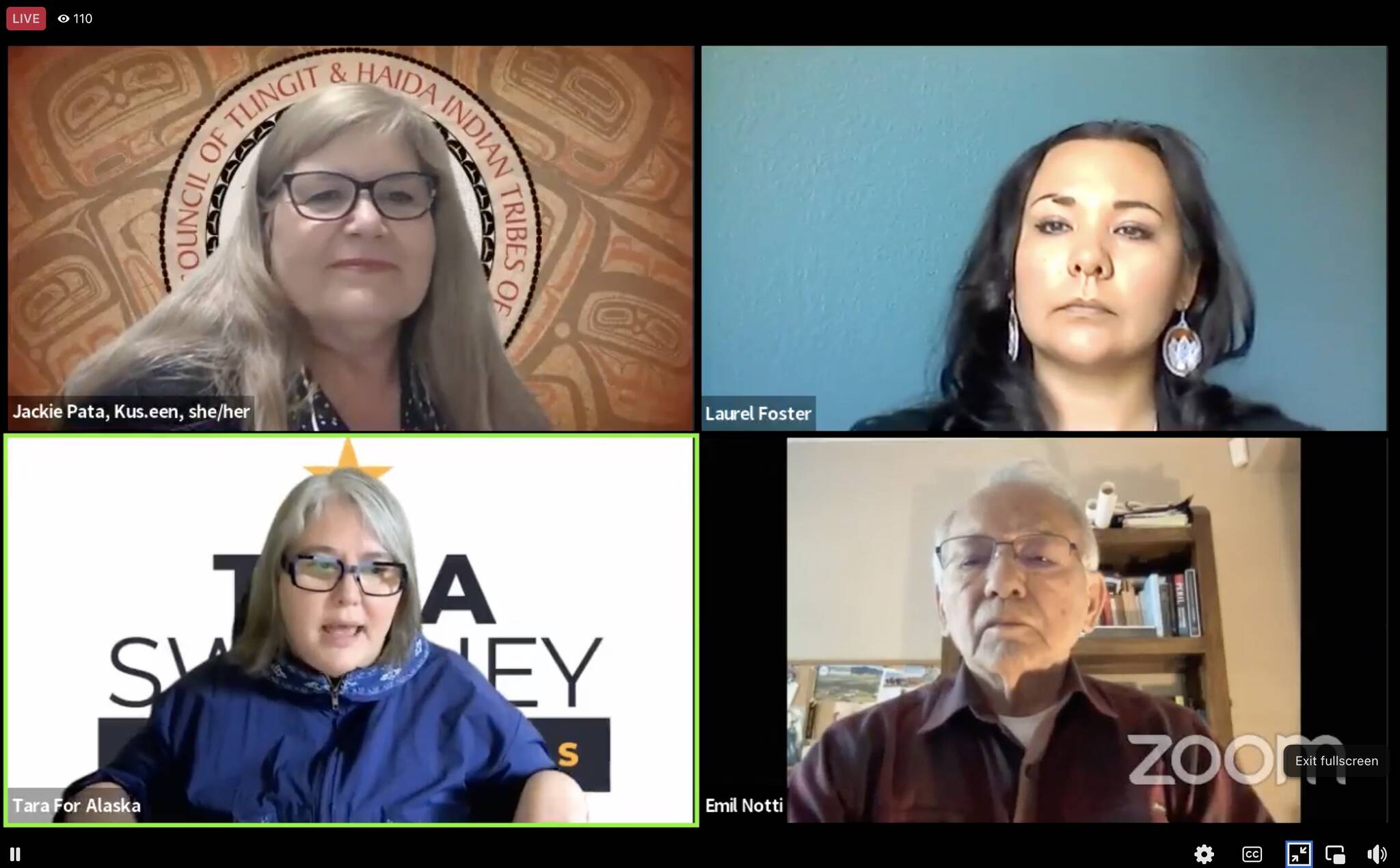Four Alaska Native candidates seeking the state’s lone U.S. House seat agreed during an online forum Thursday hosted by Juneau Native leaders that diverse representation is needed in Washington, D.C. – and while having many issues in common, were about as diverse as four contenders can be.
Participating in the full 50-minute forum were Emil Notti, a Koyukuk Democrat who at 89 the is oldest of the nearly 50 candidates in the race; Laurel Foster, an Anchorage nonpartisan paralegal who is Cup’ik; and Tara Sweeney, an Utqiagvik Republican who served as assistant secretary of Indian Affairs during the Trump administration participated in the midday Native Issues Forum hosted by the Central Council of the Tlingit and Haida Indian Tribes of Alaska. The fourth candidate, Mary Peltola, a Democrat who was a state representative for the Bethel region for a decade, left the forum early due to what she said was a prior commitment.
While each of the participants agreed it’s important Alaska’s next House member can represent the voices of all Alaskans, including being fully aware of Native issues, they disagreed on what the priorities for those residents should be and how they’d provide that representation in the unprecedented political turmoil now occurring in the nation’s capital.
Sweeney said her recent experience there, amid some of the worst of the turmoil, makes her the best qualified among all 50 candidates seeking to replace the late, longtime Rep. Don Young. She cited health care, food security and sovereignty, and having tribal entities working cooperatively with the rest of Alaska’s population as top challenges she feels need addressing.
“We do need that diversity in Washington, D.C., and somebody who can represent the views of Alaska Natives inside that pressure cooker in Washington,” she said. Noting she served during the longest government shutdown in history and the COVID-19 pandemic, she asserted she’s “able to understand that pressure, and walk in and represent the needs of this state in tumultuous times.”
Notti, who was the Alaska Federation of Natives’s first president and helped author the Alaska Native Claims Settlement Act, said his top priority is getting big money out of politics because the agendas of such donors become the sole interest of lawmakers and “that’s not good for our government.”
Next, he cited the environment which “drastically needs attention.”
“In Alaska we’re looking at (problems with) our shorelines in the northwest and west,” he said.
“Salmon not showing up in the Yukon and Kuskokwim rivers. We spend millions repairing roads from permafrost damage from rising temperatures. It also threatens our oil and gas lines.”
Foster, who emphasized her “putting people over political agendas” motto multiple times, said “having a deep understanding of the differences between rural and urban environments is something our representative needs to be able to understand.” She cited access to health care, public safety and climate change among her top priorities, although with the latter also stated it’s important to have a realistic approach.
“If we focus on trying to stop climate change we are setting ourselves up for failure because climate change is coming,” she said.
Instead, it’s important to focus on mitigating measures, including affordable and renewable energy production and infrastructure, while also recognizing in Alaska there’s not a “one-size-fits-all approach.”
Peltola, who said she was getting ready to board a flight in Bethel to go to a graduation ceremony right as the forum started, emphasized in her opening statement she strongly supports landless tribes in Southeast Alaska because “that’s been an ongoing issue for too many generations.”
“I’m thankful Don Young was a champion of making sure the landless tribes were allocated the few acres (they received) – considering how big the Tongass is, we’re not talking about very many acres for the people of those communities,” she said. She said she also supports lands-into-trust and “I would try to get the timeline from an average of timeline years to 12 months; I think that’s much more appropriate.”
The other three candidates also subsequently said they supported lands-into-trust when asked about it toward the end of the forum. Foster also emphasized reducing the timeline of processing claims, Notti said “I think regional corporations should put their muscle and technical ability into getting land trusts for villages,” and Sweeney said the existing problems illustrate flaws in the political process
“What happens is you have a change of administration and each goes to tackle various issues in their own manner,” she said. “There has been a back-and-forth across five administrations that has focused on the underlying issue on whether the law permits lands-into-trust.”
Of the candidates participating in the forum, only Peltola and Sweeney received enough support to be named in a poll posted May 10 by Ivan Moore. Peltola ranked fifth with 6% of survey respondents favoring her and Sweeney sixth at 4%, behind Sarah Palin at 19%, Nicholas Begich at 16%, Al Gross at 13% and Santa Claus at 6%.
Moderator Jacqueline Pata, who is Tlingit & Haida’s 1st Vice President, concluded the forum by noting mail-in ballots for the special primary election must be postmarked by June 11 – but urged those watching the forum to get them in earlier.
“Vote before Celebration because afterward you’ll be too tired to cast that ballot,” she quipped.

